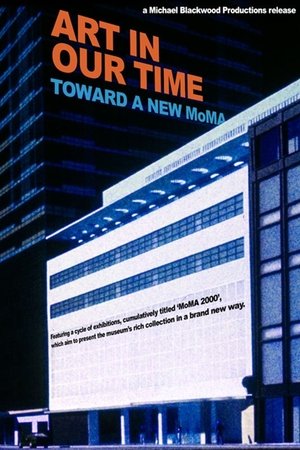Art in our Time: Toward a New Museum of Modern Art (2001) [N/A]
Featuring:
John Elderfield, Peter Galassi, Agnes Gund, Philip Johnson
Directed by:
Michael Blackwood
Release Date:
January 1, 2001
Original Title:
Art in our Time: Toward a New Museum of Modern Art
Ratings / Certifications:
N/A
Runtime: 58
"Art in Our Time: Toward a New MoMA" features a cycle of 'end of century' exhibitions, cumulatively titled 'MoMA 2000', which aim to present the museum's rich collection in a brand new way. Instead of MoMA's famously traditional chronological installation, oriented heavily towards the 'School of Paris', the curators assembled works by themes which offered the public a new approach to the understanding of the art of our time. One aspect of this different approach was to experiment with finding new ways for MoMA to connect more decisively with the art of the present, as the term 'modern' can be construed as the art of the first half of the last century. By masterfully juxtaposing art of the past with art of the present, MoMA has encouraged it's visitors to observe, contemplate and process iconic pieces spanning the last century.
The Museum of Modern Art in New York was founded in 1929 by three inspired society women who wanted to make contemporary art accessible to the public. They had the good fortune to find a brilliant collaborator, Alfred Barr, as their chief curator and director. At the time contemporary art was not as intensely collected as it is today, while Barr had an eye for exceptional work. So began a most remarkable collection, which is unsurpassed to this day. The program dwells on the riches of this collection, which was presented with a fresh point of view, as the museum's 'end of the century' cycle of exhibitions titled 'MoMA 2000'. Instead of MoMA's famous traditional installation of the collection in chronological order, oriented heavily towards the ' School of Paris ', the curators assembled works by themes which offered the public a new approach to the understanding of the art of our time. One aspect of this different approach was to experiment with finding new ways for MoMA to connect more decisively with the art of the present, as the term 'modern' can be construed as the art of the first half of the last century. A substantial part of this effort is also the museum's reorganization in a much expanded building designed by Yoshio Taniguchi, which was completed in 2004. Since then MoMA has been in the process of finding the best way to present itself and the collection in the new space ART IN OUR TIME: Toward a new MoMA gives a sense of the museum's attempts at finding a new direction for itself, with emphasis on its astounding collection. It is presented to the camera by the curators of the three cycles of the 'end of the century' exhibitions. The video also looks back to the beginnings of the institution and the cast of characters of those early days.






